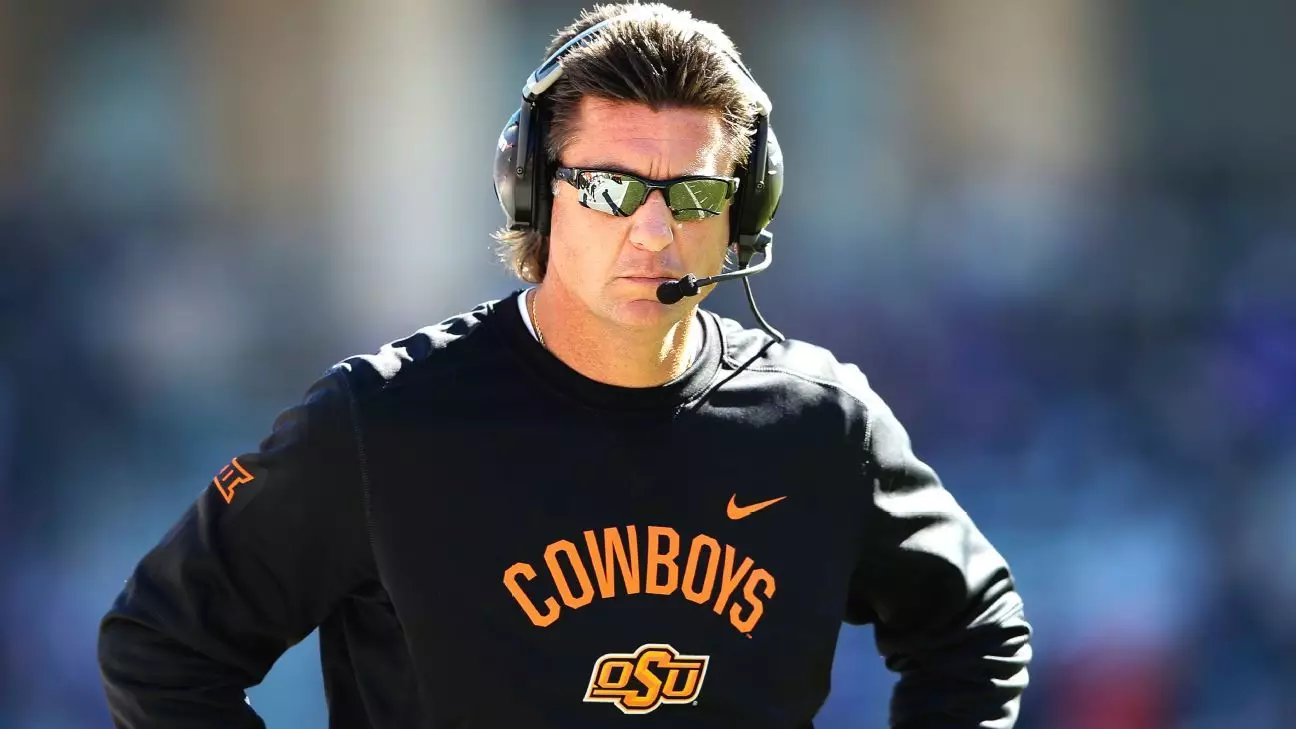The Oklahoma State Cowboys have made a significant decision regarding their head coach, Mike Gundy, who will continue to lead the team following the restructuring of his contract. The agreement, reached just days after intense discussions among the university’s board of regents, highlights the intricate relationship between performance, finances, and player welfare within college athletics.
The turmoil surrounding Gundy’s contract negotiations is emblematic of the broader upheaval in college football, where leadership changes and financial management often coexist uneasily. Recent reports confirm that Oklahoma State’s regents convened for an emergency meeting to discuss Gundy’s future and other staff employments. Chairman Jimmy Harrel acknowledged that while resolutions were not immediately reached, there was a clear plan in place moving forward. This demonstrated a commitment to keeping Gundy, albeit with notable financial adjustments.
The urgency of the negotiations arose from Gundy’s disappointing 3-9 season, marking one of his worst records since taking the helm in 2004. The Cowboys also endured a humiliating 52-0 defeat against Colorado, which further intensified discussions around the coach’s future. Amidst this backdrop, the decision to restructure Gundy’s $7.75 million annual salary signifies a major shift in priorities, notably placing emphasis on revenue sharing with players—a hot-button issue in contemporary college sports.
As part of the new agreement, Gundy’s salary has been revised, with a portion being diverted towards initiatives aimed at benefiting the players. This approach not only serves to align financial resources with the well-being of student-athletes but also reflects incremental changes in college athletics driven by ongoing debates over athlete compensation. Additionally, the reduction of Gundy’s buyout, previously pegged at $25.3 million, indicates built-in flexibility during uncertain times. Such financial maneuvering raises essential questions regarding how institutions balance their obligations to coaches versus the emerging expectations from players.
It’s worth noting that Gundy’s willingness to accept a pay cut stems from previous experiences, as he had undertaken similar salary and contract adjustments in 2020 after internal and external criticism regarding his leadership techniques. This history may reveal a coach who understands the evolving landscape of college football, recognizing the need for collaboration and adaptability in order to sustain both his career and the program’s success.
Within the university, there are mixed sentiments about Gundy’s leadership, as illustrated by the divided opinions among regents. While some, including university president Kayse Shrum and athletic director Chad Weiberg, expressed support for Gundy, at least one regent favored his departure. Such dichotomies reflect the realities of college football programs, where successes and failures resonate with various stakeholders.
Gundy’s track record cannot be dismissed; he stands as the all-time winningest coach for the Cowboys, boasting a remarkable 169-88 record. His accomplishments include leading Oklahoma State to the Big 12 title in 2011 and numerous bowl appearances. However, the intensity of the current scrutiny reveals that past accolades may not sufficiently secure his position without tangible improvements in performance.
As the offseason progresses, Gundy faces mounting pressure not only to select capable coaching personnel but also to navigate the financial and structural changes that accompany a restructured agreement. The immediate future will require him to demonstrate adaptability, especially after he fired both offensive and defensive coordinators, signaling a commitment to revitalizing the team.
The coming season represents a critical juncture for Gundy and the Cowboys. With a history of winning seasons, including eight seasons with at least ten wins in the last 14 years, maintaining competitiveness in the Big 12 will be paramount. The expectations will undoubtedly be higher, not only from fans and the university’s administration but also from the players, who stand to benefit from the redistribution of resources.
The Oklahoma State Cowboys’ journey under Mike Gundy’s new contract will thus be a litmus test for broader trends in college sports—examining the intricacies of financial commitments to coaches, the evolution of player welfare, and the unforgiving nature of performance in high-stakes college football.

Leave a Reply